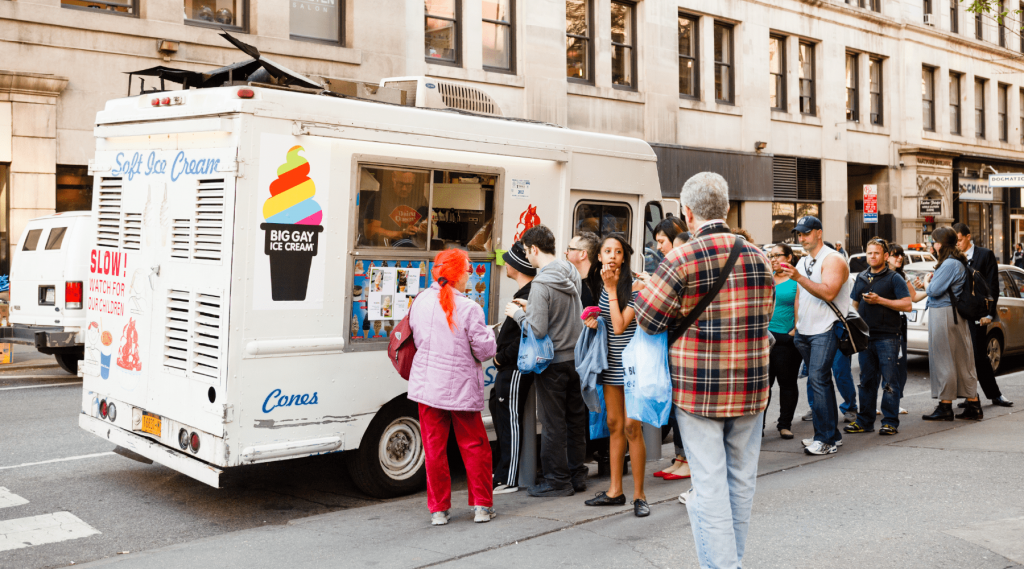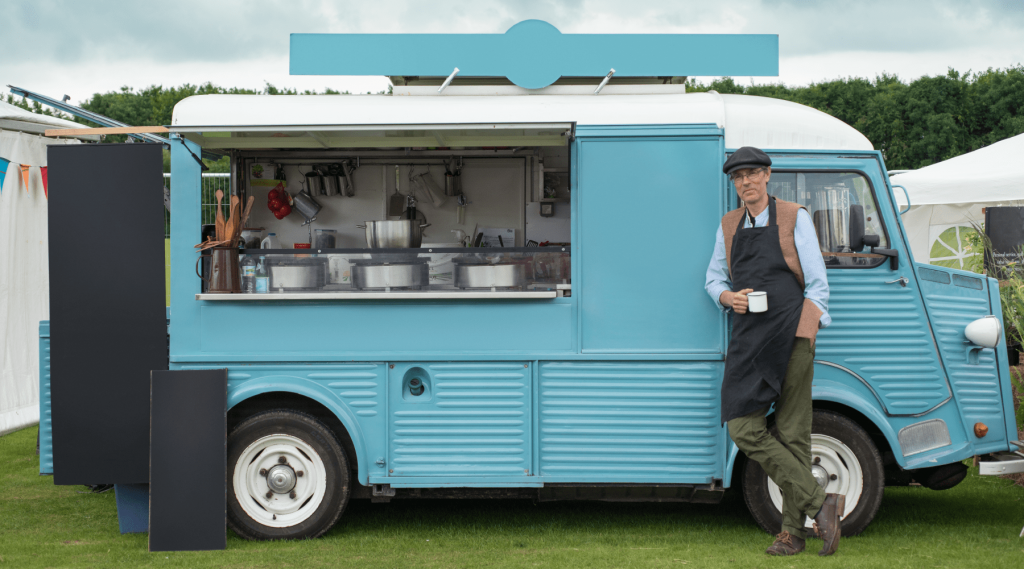Food truck business plan
Looking to open a food truck? Before you begin, you’ll need to map out a business plan. Why? Because having a business plan helps outline everything from the initial beginning budget to the projected yearly sales. A business plan can also impress potential business investors. They may be more willing to invest in your food truck if you show them your plan for success.
In your business plan, make sure to include the following:
- Executive summary – this is just a quick summary of your plan.
- Company description – this helps the reader understand the type of food truck, the name, the location, and any other legal entities necessary. It’s also a good idea to include a blueprint of your food truck.
- Market analysis – this is very important for investors; they want to know how your food truck will grow and be successful. List details about your target audience and why customers will choose you over competitors.
You can write up your business plan on your own, but if this is your first business venture, you might want to pay an expert to write the plan that can consult on any legal and tax requirements you’ll need to comply with. Make sure you do your research and understand it well since running a food truck is bigger work than most expect. After you complete your business plan, you are ready to begin the process of opening your first food truck!
So, what is a food truck?
A food truck is a large-wheeled vehicle from which food is sold, which normally contains facilities to prepare the food for sale. In other words, a food truck is like a mobile restaurant. The main differences between a food truck and a traditional restaurant are lower overheads and the ability to move around to wherever customers are. You’ll typically find food trucks selling to people on the street, but they’re also fixtures at large events like festivals and concerts.
Opening your first food truck
The food truck sector is one of the fastest-growing parts of the food industry. There are more than 4,000 food trucks in the US with an annual revenue rate increase of 7.9% from 2011 to 2016. The appeal of food trucks to customers is that they have access to a wide selection of food and drink at affordable prices combined with the distinct atmosphere of being served from a vehicle. Aspiring food truck owners are enticed by being able to cook and serve food without the high overheads and headaches associated with running traditional restaurants.
If you’d like to be part of this growing trend, here are some useful tips for your food truck business plan:
- Choose a concept
- Find out about local conditions
- Determine where your food truck will be located
- Apply for licenses and permits
- Work out expenses
- Finance your food truck
- Select a name
- Create a menu
- Buy a truck
- Customize your food truck
- Order your supplies
- Get insurance
- Promote and market your food truck
Choose a concept
The food truck concept has moved beyond a burger van. Food truck owners are becoming more adventurous, offering unique cuisines that set their food apart from their competition. For example, the Barkery food truck is truly unique as its food caters only to dogs. You need to find a balance between foods that you’re comfortable cooking and what your customers will want.
Take the following into consideration when deciding on a concept for your food truck:
Equipment – Given that there’s only a limited amount of space in a food truck, you need to choose a concept that can be achieved with the most economical (but practical) equipment.
Time – Your concept has to cater to customers who will be visiting your food truck area at a specified time. For example, you may be permitted to operate your food truck only at lunchtimes. Therefore, you need to have quick cooking times so you can serve as many customers as possible within a certain timeframe.
Ease – Food truck cuisine is the ultimate convenience food. Therefore, your concept has to include food that’s easy to carry and eat. Your food should be reasonably priced and convenient enough for your customers to eat anywhere.
Find out about local conditions
While you’re thinking about the concept for your food truck, you should make inquiries about what is required for you to set-up business. Depending on your city, you may find it difficult to identify specific food truck requirements. Your first point of inquiry should be your city’s website to search specifically for information about food trucks. If this is unavailable, make contact with the department that deals with restaurants to find out whether they can provide guidance about opening your food truck.
You can also find out whether your city has an association for people who own (or are thinking about opening) food trucks. For instance, the New York Food Truck Association (NYFTA) provides its members with useful advice and business opportunities. In addition to local requirements, you should also check whether there are any conditions on opening a food truck that is imposed at a state level.
Determine where your food truck will be located
Finding out where you can serve customers from your food truck is an important part of your research. You may think that you have the ideal spot in mind, but you’ll need to clarify with your city whether food trucks are allowed in a particular location. Some cities ban food trucks in certain areas and others, like New York, have a designated amount of permits they allocate to food trucks.
You need to get the necessary permission before you set-up your food truck in any area of your city. If you manage to secure your ideal spot for your food truck, you’ll need to consider the logistics of parking and moving your vehicle. Ask yourself if you’ll be moving your food truck every day and, if so, think about where you will park it overnight.

Apply for licenses and permits
You need to comply with regulatory requirements when opening a food truck. Since you’ll be handling and serving food, many of the obligations placed on restaurant owners will also apply to you. Health and safety and fire safety codes are just some areas that you’ll need licenses and permits for. Here are some permits that you’ll need to open your food truck:
- A license to legally allow you to operate a food truck
- A permit that authorizes you to run a food truck when you have received the appropriate license
- Business license
- Zoning permit
- Health permit
- Alarm permit
Work out expenses
Buying the food truck is the most important (and largest) expenditure, but there are additional costs to be considered before opening a food truck business. You’ll need an investment of about $50,000 to open and run a food truck. Additional expenses include:
- Equipment
- Employee pay
- Fuel
- Inventory
You should budget for the eventuality to have enough capital to sustain your food truck business just in case it takes some months to make a profit.
Finance your food truck
Unless you have the investment upfront, it’s likely that you’ll need to finance your food truck. Opening a food truck costs less than a conventional restaurant. However, you’ll still need to create a viable business plan if you’ll be looking for external sources of finance. You could also adapt your food truck business plan from restaurant business plans.

Select a name
After you’ve familiarized yourself with local and state requirements, you’re clear on your concept and know how you’ll finance your food truck, it’s time to look at the practical side of opening a food truck business. Choose a name that’s catchy and matches your theme. Ideally, your name will include the type of food you serve, so customers will know what to expect. On the other hand, you could choose an abstract name to create a sense of intrigue.
Create a menu
To avoid being overwhelmed with cooking too many dishes, serve a limited menu from your food truck. Create a menu with familiar dishes or ingredients as well as adding your own unique touch. Keep in mind that the food you serve should be quick to prepare so that customers aren’t kept waiting unnecessarily at busy times. You’ll also need to factor in the design of your menus. Food trucks don’t have conventional restaurant menus, but you do need to offer potential customers a to-go menu as well as displaying your dishes on a menu board outside your truck.
Buy a truck
Whether you’re buying a new or used vehicle, getting a food truck is one of the most important decisions you’ll need to make. A new food truck fully kitted-out with the equipment you need could cost more than $75,000. Used food trucks start from $15,000 upwards. There are websites, like UsedVending.com, that specialize in the sale of food trucks or you can check out auction sites, like eBay, to look for a truck that would suit your needs. When you’re looking for a food truck, keep in mind that there may be some equipment that is necessary to comply with the relevant laws and regulations.

Customize your food truck
Just as your menu should include unique variations, your food truck design should also be distinctive enough to set you apart from your competitors. Make your food truck stand out, so your customers will want to take photos and share them – resulting in some free publicity. You can either paint your food truck or use vinyl wraps from a company like vehiclewrapping.com to achieve your desired design.
Order your supplies
The standard equipment for most food trucks include:
- Fridge/freezer
- Food preparation area
- Water heaters
- Gas cylinders
- Waste disposal system
As well as equipment, you’ll also need to ensure that you have enough inventory, so you don’t run out of ingredients. A point of sale (POS) system will help you to keep up with the ingredients you need and also other necessary items, such as plastic cutlery and napkins.
Get insurance
Insurance is a necessary requirement for any business and opening a food truck is no exception. You’ll need to be able to prove that you have the correct level of insurance for the following:
Your truck – As well as vehicular insurance, you should consider taking out property insurance to safeguard the equipment in your truck.
Your business – Commercial liability insurance will protect your food truck business in the event of customer injury. This insurance will also protect you from other complaints like lawsuits.
Your employees – If you’re hiring employees to work in your food truck, your city may mandate that you take out disability and workers compensation insurance.
Promote and market your food truck
One benefit of having a food truck is that it’s a mobile advert. You’re advertising your business whenever you drive your truck. However, you can always do more to market your food truck business. Social media is the go-to method for promoting your food truck for free or at very low cost.
Although it’s more effective to have accounts with the major social platforms like Instagram, Facebook, and Twitter, it’s best to focus on one platform rather than spreading yourself too thinly. If you move your food truck to different locations, you should notify your followers about where you’ll be. The advantage of social media is that adverts can be targeted at a local level, so you can reach the people who are likely to be in the vicinity of your food truck.
You could also reach out to local influencers and bloggers to see if they can promote your food truck to their fans.

You can also create a buzz on social media by posting videos of people lining up for your food. Use a hashtag, so people can easily identify your food truck.
Open for business
Opening a food truck business needs careful thought and consideration. Just because the requirements are less burdensome than traditional restaurants, it doesn’t mean that there isn’t a great deal to consider. You’ll need to apply for the right permits and licenses to remain compliant with laws and regulations.
You’ll also need to create a menu that’s easy to prepare, profitable, and one that your customers will love. Despite the numerous requirements, opening a food truck is an increasingly popular way of entering the food services industry. The tips above should give you some food for thought about whether you’re willing to go through the rigorous process of opening a food truck.
Do you own a food truck business? Share your tips and experience with others in the comment section below.
